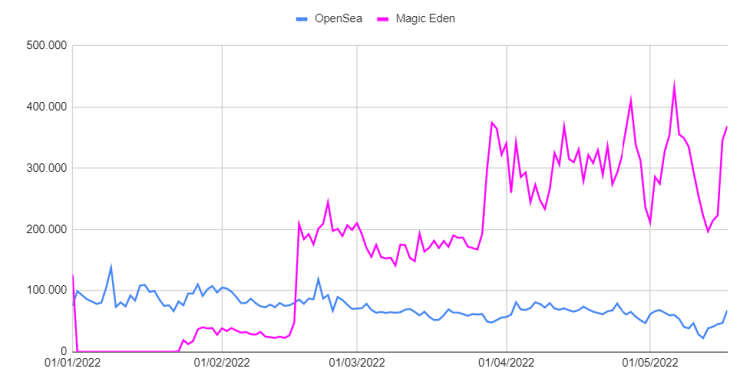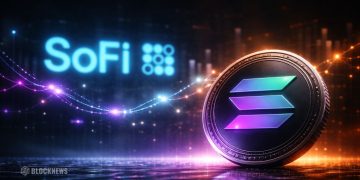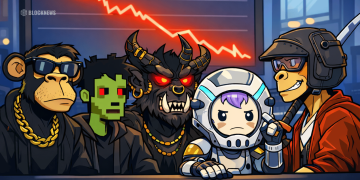It’s still early days for the Solana NFT market, and it remains to be seen if Magic Eden can keep up its momentum or if OpenSea will reclaim its position as the go-to NFT marketplace.
With gas prices on Ethereum remaining high, it’s likely that traders will continue to look for alternatives. And with Solana’s scalability advantages, the ecosystem is well-positioned to provide them.
Magic Eden in the Bear Market
According to DappRadar’s weekly data, Magic Eden has seen roughly 275,000 daily transactions (including purchases, bids, and listings) in contrast to OpenSea’s 50,000.
According to data on their website, Magic Eden has seen 330,000 true sales over the last week (not bids and listings like DappRadar’s data), which equates to approximately 47,000 daily transactions.
Although OpenSea has a larger number of unique users trading NFTs, the balance is still in favor of Magic Eden. According to DappRadar, Magic Eden has hosted 24,000 traders in the last 24 hours, whereas OpenSea has hosted 41,000.
Despite greater transactions on Magic Eden, the scarcity of blue-chip NFT projects on Solana has resulted in lower overall sales volume, despite more transactions.
OpenSea retains its position as the most active NFT exchange, with $35 million in sales volume compared to Magic Eden’s $10 million. The average price of an OpenSea NFT trade was also greater than Magic Eden’s ($700 versus $123), despite the fact that it has a significantly shorter trading history.
The Possible Emergence of Magic Eden
The way NFT traders interact with the two platforms is likely to be affected by network costs on the various blockchains. The gas expenses to buy a single Ethereum-based NFT on OpenSea presently range from $30 to $40, whereas Solana fees are less than a penny.
Over a 30-day period, usage statistics are rather similar, with OpenSea’s total volume of traders declining by 1% versus the previous month but Magic Eden’s growing 316%.
On-chain data of this sort may also be deceptive, since metrics like as transactions and sales volume are open to various interpretations and even manipulation.
In the end, the NFT market is shifting away from its previously Ethereum-dominated modus operandi as traders increasingly trade across alt-chain marketplaces and user transactions rise with lower costs.
OpenSea does not, of course, have its own Solana NFT trade. Early April saw the introduction of a partnership between OpenSea and Solana NFT, which has yet to spark much interest. According to data from Magic Eden, usage on the platform lags behind the hype, with Solana NFT sales on OpenSea accounting for a measly $1,000 in the past week.
It’s too early to tell if this is a temporary trend or a sign of things to come, but it’s clear that the rise of Solana NFTs has given Magic Eden a much-needed boost.













